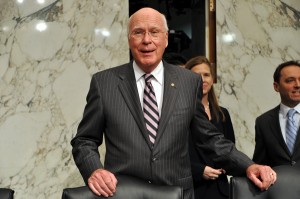National
DOMA repeal supporters seek Senate hearings
But Congress unlikely to overturn law anytime soon

Supporters of repealing the Defense of Marriage Act are calling on the Senate to hold hearings on the impact the denial of the federal benefits and responsibilities of marriage is having on married same-sex couples throughout the United States.
Evan Wolfson, executive director of the New York-based Freedom to Marry, said hearings before the Senate could help raise the level of discussion on marriage on Capitol Hill.
“One of Freedom to Marry’s top goals is to take the marriage conversation in Washington, D.C., to a higher level — putting real faces, presenting the real evidence and dispelling the bogus arguments — to give elected officials and other policy makers a better understanding of why marriage matters,” Wolfson said. “Holding hearings is certainly one important opportunity for us to help continue the momentum in support of overturning DOMA and ending marriage discrimination.”
A Senate Democratic aide, who spoke on condition of anonymity, also emphasized the importance of hearings as legislative repeal remains unlikely during the 112th Congress.
“One of the key steps that senators can take to build momentum is to have a hearing, or hearings, on the topic,” the aide said. “I think a thorough and perhaps even a dramatic hearing could galvanize opinion in the Senate and hopefully even serve as a galvanizing moment more broadly in the public.”
As a result of DOMA, which was passed by Congress in 1996, married same-sex couples cannot participate in federal programs. For instance, they can’t file joint federal income taxes, receive spousal benefits under Social Security or obtain exemptions of the estate tax law upon the death of one of the spouses.
Last week, Sen. Dianne Feinstein (D-Calif.) introduced legislation in the Senate known as the Respect for Marriage Act, which would repeal the anti-gay statute. Rep. Jerrold Nadler (D-N.Y.) has introduced companion legislation in the House. Neither piece of legislation has any Republican co-sponsors.
Favorable hearings on DOMA repeal are unlikely in the House with Republicans in control of the chamber. Rep. Lamar Smith (R-Texas), chair of the House Judiciary Committee, has spoken out in support of maintaining the anti-gay statute.
Consequently, the decision on whether to hold hearings rests with Sen. Patrick Leahy (D-Vt.), chair of the Senate Judiciary Committee. Known as an LGBT advocate, Leahy is among the co-sponsors of the DOMA repeal legislation.
A Judiciary Committee spokesperson said she couldn’t provide a comment on whether Leahy intends to hold hearings during the 112th Congress because he’s currently serving as part of a congressional delegation overseas.
Even with support growing in the Senate, the repeal legislation faces tremendous odds against reaching President Obama’s desk during the 112th Congress with Republicans in control of the House. Even with Democrats in control of the upper chamber, reaching the 60-vote threshold for passage of the Respect for Marriage Act in the Senate would be challenging.
Maggie Gallagher, chair of the anti-gay National Organization for Marriage, told the Washington Blade via e-mail that she would appreciate the opportunity to speak at a congressional hearing on marriage, but questioned why they would need to take place if DOMA repeal legislation has no chance of passage.
“I certainly would welcome a chance to make the case for DOMA again, personally, however I think it would be rather silly for the Senate to waste its time on hearings on a bill that has exactly zero chance of passage,” she said.
But Richard Socarides, president of Equality Matters, said hearings could be part of the plan that would bolster support for passage of the legislation in the Senate.
“If we’re able to get Senate Judiciary Committee hearings, I think the right thing to do would be obvious for a lot of senators,” Socarides said. “It’s possible at some point before the end of this Congress, we could have a majority of senators who understand the importance of repealing this law. … It’s very important to make progress and hearings could be an important part of that.”
Despite the challenges in passing DOMA, a change in administration policy and growing public support for same-sex marriage is changing the landscape for the statute’s repeal.
Last month, President Obama announced he believes DOMA is unconstitutional and that the U.S. Justice Department would no longer defend DOMA in court against litigation. House Speaker John Boehner has directed the House general counsel to take up defense of the statute in court.
Additionally, a Washington Post-ABC News poll published last week found 53 percent of Americans support same-sex marriage and significant gains in support for same-sex marriage in religious communities. The poll indicates a 23-point in support increase among white Catholics, a 16-point increase among nonevangelical white Protestants, and an 11-point increase among evangelicals.
The Senate Democratic aide said both these developments will have a “big impact” on generating support for the eventual overturning of DOMA. Additionally, the aide said the success last year of passing legislation allowing for “Don’t Ask, Don’t Tell” repeal created a climate that could allow for DOMA repeal.
“We saw these unexpected Republicans like Richard Burr and John Ensign voting for ‘Don’t Ask, Don’t Tell’ repeal and I think that part of the message that I’m hearing from people who are pushing DOMA repeal along is that if a gay person is good enough to fight and die for their country now openly, then why should they also have the right to marry?” the aide said. “I think that’s a powerful sort of one-two punch.”
Federal Government
Top Democrats reintroduce bill to investigate discrimination against LGBTQ military members
Takano, Jacobs, and Blumenthal sponsored measure

Multiple high-ranking members of Congress reintroduced the Commission on Equity and Reconciliation in the Uniformed Services Act into the U.S. House of Representatives and the U.S. Senate, aiming to establish a commission to investigate discriminatory policies targeting LGBTQ military members.
Three leading Democratic members of Congress — U.S. Rep. Mark Takano (D-Calif.), who is the House Veterans’ Affairs Committee’s ranking member and chairs the Congressional Equality Caucus; U.S. Sen. Richard Blumenthal (D-Conn.), who is the Senate Veterans’ Affairs Committee’s ranking member; and U.S. Rep. Sara Jacobs (D-Calif.) — introduced the bill on Tuesday.
The bill, they say, would establish a commission to investigate the historic and ongoing impacts of discriminatory military policies on LGBTQ servicemembers and veterans.
This comes on the one-year anniversary of the Trump-Vance administration’s 2025 Executive Order 14183, titled “Prioritizing Military Excellence and Readiness,” which essentially banned transgender servicemembers from openly serving in the Armed Forces, leading to the forced separation of thousands of capable and dedicated servicemembers.
In a joint statement, Takano, Blumenthal, and Jacobs shared statistics on how many service members have had their ability to serve revoked due to their sexual orientation:
“Approximately 114,000 servicemembers were discharged on the basis of their sexual orientation between WWII and 2011, while an estimated 870,000 LGBTQ servicemembers have been impacted by hostility, harassment, assault, and law enforcement targeting due to the military policies in place,” the press release reads. “These separations are devastating and have long-reaching impacts. Veterans who were discharged on discriminatory grounds are unable to access their benefits, and under the Trump administration, LGBTQ+ veterans and servicemembers have been openly persecuted.”
The proposed commission is modeled after the Congressional commission that investigated and secured redress for Japanese Americans interned during World War II. Takano’s family was among the more than 82,000 Japanese Americans who received an official apology and redress payment under that commission.
The press release notes this is a major inspiration for the act.
“Qualified servicemembers were hunted down and forced to leave the military at the direction of our government,” said Takano. “These practices have continued, now with our government targeting transgender servicemembers. The forced separation and dishonorable discharges LGBTQ+ people received must be rectified, benefits fully granted, and dignity restored to those who have protected our freedoms.”
“LGBTQ+ servicemembers have long been the target of dangerous and discriminatory policies—resulting in harassment, involuntary discharge, and barriers to their earned benefits,” said Blumenthal. “Establishing this commission is an important step to understand the full scope of harm and address the damage caused by policies like ‘Don’t Ask, Don’t Tell.’ As LGBTQ+ servicemembers and veterans face repugnant and blatant bigotry under the Trump administration, we will keep fighting to secure a more equitable future for all who serve our country in uniform.”
“Instead of righting wrongs and making amends to our LGBTQ+ service members and veterans who’ve suffered injustices for decades, I’m ashamed that the Trump administration has doubled down: kicking trans folks out of the military and banning their enlistment,” said Jacobs. “We know that LGBTQ+ service members and veterans have faced so much ugliness — discrimination, harassment, professional setbacks, and even violence — that has led to unjust discharges and disparities in benefits, but we still don’t have a full picture of all the harm caused. That needs to change. That’s why I’m proud to co-lead this bill to investigate these harms, address the impacts of discriminatory official policies like ‘Don’t Ask, Don’t Tell’ and the transgender military ban, and ensure equity and justice for our LGBTQ+ service members and veterans.”
Takano and Jacobs are leading the bill in the House, while Blumenthal is introducing companion legislation in the Senate.
Takano’s office has profiled and interviewed LGBTQ servicemembers who were harmed by discriminatory policies in the uniformed services.
The Commission on Equity and Reconciliation in the Uniformed Services Act is supported by Minority Veterans of America, Human Rights Campaign, Equality California, SPARTA, and the Transgender American Veterans Association.
In recent weeks, thousands of trans military members were forcibly put into retirement as a result of Trump’s executive order, including five honored by the Human Rights Campaign with a combined 100 years of service, all due to their gender identity: Col. Bree B. Fram (U.S. Space Force), Commander Blake Dremann (U.S. Navy), Lt. Col. (Ret.) Erin Krizek (U.S. Air Force), Chief Petty Officer (Ret.) Jaida McGuire (U.S. Coast Guard), and Sgt. First Class (Ret.) Catherine Schmid (U.S. Army).
Multiple career service members spoke at the ceremony, including Takano. Among the speakers was Frank Kendall III, the 26th U.S. Air Force secretary, who said:
“We are in a moment of crisis that will be worse before it is better. Members of my father’s and mother’s generation would ask each other a question: what did you do during the war? Someday we will all be asked what we did during this time. Please think about the answer that you will give.”

Uncloseted Media published this article on Jan. 24.
This story was produced with the support of MISTR, a telehealth platform offering free online access to PrEP, DoxyPEP, STI testing, Hepatitis C testing and treatment and long-term HIV care across the U.S. MISTR did not have any editorial input into the content of this story.
This story talks about addiction and substance use. If you or someone you know needs help, resources can be found here.
By SAM DONNDELINGER | In 2015, on the patio of Nowhere Bar, a queer nightclub in Louisville, Ky., music pulsed and bodies pressed as 23-year-old Lucas Pearson moved through the flashing lights and a blur of grinding limbs.
“I just randomly started talking to this guy,” he recalls. “He had this little spoon on a necklace, scooped out a hit of white powder, and handed it to me.”
Pearson sniffed it. Euphoria washed over him, time began to slow and the dancing bodies faded into a soft haze. For more than 10 minutes, Pearson felt “entirely present.” His social anxiety, depression, and any sadness he was feeling melted away.
While Pearson wouldn’t use ketamine again for the next five years, he says the feeling of ease the drug gave him was always “in the back of [his] mind.” So when he tried it for a second time in 2020 at a farm in upstate Kentucky, he liked the way it felt to disassociate from his childhood trauma.
“We got really messed up that night on it, and I was like, ‘I love this. I’ve missed this,’” Pearson told Uncloseted Media. “‘And I’m ready for some more.’”
Over the next three years, Pearson began using every day. Working remotely in the health care industry, no one checked in on him as long as he got his work done. He used ketamine at nightclubs, social events, game nights with friends and, eventually, at home alone.
“I was actively hooked on it,” he says. “I didn’t wanna do much of anything other than find that dissociating feeling. I just kept chasing it.”
While evidence suggests that most psychedelics have a lower risk of addiction than other drugs, ketamine is an exception, in part because it affects dopamine levels. In a 2007 bulletin from the Multidisciplinary Association for Psychedelic Studies, one researcher noted that after ketamine was invented in 1962, it developed a “reputation for insidiously trapping those who really knew better.” As a dissociative drug, ketamine induces a sense of detachment from one’s body, producing a trance-like state marked by pain relief, amnesia, euphoria, and a distortion of reality.
Despite declines in the use of other recreational drugs such as cocaine, ecstasy and nitrous oxide, ketamine use continues to rise, with one study finding that use increased by 81.8 percent from 2015 to 2019 and rose another 40 percent from 2021 to 2022. That increase is driven in part by ketamine’s growing legitimacy as a treatment for depression, anxiety, OCD, trauma, and even addiction.
As a result, ketamine clinics have proliferated across the U.S. with relatively few guardrails. At least a thousand clinics now offer off-label ketamine treatments outside of FDA-approved protections. Many commercial providers advertise same-day appointments and “almost immediate results.”
Alex Belser, a psychologist who studies psychedelic use in the queer community, says ketamine use has become pervasive among gay men. A 2025 study found that gay and lesbian adults in the U.S. are almost four times more likely to use ketamine than their heterosexual counterparts, and a 2011 study from the U.K. found that queer men were over three times more likely than queer women to use the drug.
Belser thinks ketamine use is so popular among gay men in part because of the high rates of loneliness, rejection, and trauma they experience. “Ketamine is not inherently good or bad. When used thoughtfully with integrity, with good protocols, it can be a really helpful medicine. But if left unregulated, with the amount of access and normalization we have, it can lead to addiction, harm, isolation, and bad outcomes,” he says.
Belser believes health misinformation is fueling a misunderstanding among gay men about the actual harm the drug can cause. “The medical and clinical communities have failed people by not adequately telling them that ketamine can lead to addiction and problematic outcomes,” he says. “It can serve people, but it can also damage people.”
‘Happy people don’t do ketamine’
Part of the appeal of ketamine is that dissociative feelings can relieve depressive symptoms, making it alluring to those who have trauma or mental health disorders. While properly regulated treatment works for some people, psychiatrist Owen Bowden-Jones says that he senses “the vast majority [of those addicted] are using it to self-medicate for emotional distress.”
“I always wanted to numb out my past,” says Pearson. “For the longest time, I saw ketamine as a possible way out.”
Pearson, now 33, was raised in a conservative and religious family. When he came out as gay to his mom at 16, he cried so much that he couldn’t speak and had to write it on a piece of paper and hand it to her.
“She stormed out of the house and ended up calling every member of the family and outing me. So that was really painful,” he says. “My whole childhood, I did not feel like I could be who I knew I was.”
“So when I picked up drugs, it was definitely a thought in my mind: This life that I lived as a child, I don’t want to feel it anymore,” he says. “I just want to numb it.”
One study shows that gay men are over three times as likely to develop PTSD compared to their heterosexual counterparts. Trauma can be one event or a “long string of daily hurts, such as … homophobia, bullying, and time spent in the closet,” according to Chris Tompkins, a licensed family therapist who works with gay men. Research shows that people who experience trauma are more likely to have addiction issues.
J, a 33-year-old marketing researcher based in Los Angeles, says his ketamine use began casually in his early 20s in New York’s queer nightlife scene, where the drug circulated freely. What started as an occasional escape intensified during the pandemic, when isolation, depression, and easy access turned ketamine into a daily habit.
“There’s a pretty fair connection between feelings of not being normal and my ketamine addiction,” J told Uncloseted Media. “I was bullied for being more feminine. My sexuality was a subject of speculation and that forced me to close down. So something like a dissociative drug is appealing because it either allows me to continue those blocks or to bring down the barriers.”
“There was a night when I had done K for the first time in a while, and the next couple of days, I felt so good,” he says. “I felt like my depression had lifted, and that feeling of doubt and fear I’d had throughout my life was totally gone.”
After that night, J, who asked to use a first initial to protect his identity, started using ketamine daily to chase the feeling of euphoria and relief. He got a prescription for ketamine treatment therapy, but he says it wasn’t enough.
“There were days when I would go do an infusion of ketamine and I would do more at home on my own. If I have the ability to escape feelings, to numb feelings, I will go after that.”
Many ketamine clinics in the U.S. advertise ketamine therapy as a cure-all. For example, the online clinic Better U promises that ketamine therapy will help you say goodbye to “Trauma,” “Chronic Stress,” “Depression and Anxiety,” “OCD,” “PTSD” and “Grief.”
What the clinic doesn’t note on its landing page is the possibility of addiction, which is what happened to J. While a common dose of ketamine is between 30-75 mg, J began using multiple grams a day. He spent thousands of dollars a month on ketamine and began structuring his life around the drug. “It stopped being about going out or having fun,” he says. “It just became what I did day in and day out.”
“Happy people don’t do ketamine,” Tasha, who is in recovery from a six-year-long addiction, told Uncloseted Media. She first tried the drug for fun at 17, but it became a problem after her father died when she was 26. At her peak, she was taking six to nine grams every day and up to 24 grams over the weekends.
“The wheels just fell off,” she says. “It’s an escapism drug — of course people with more trauma will do it more. You want to forget about everything so you take it and then it stops becoming fun and you don’t want to see your friends anymore. You just stay in your home behind closed doors sniffing K to get out of your head.”
The physical consequences of ketamine
Tasha didn’t know that chronic ketamine use can cause inflammation, ulceration, and damage or scarring to the bladder, liver, kidneys, and gallbladder. After using it for six years, she checked herself into the intensive care unit.
“I was just writhing in pain from K cramps, like a sharp stabbing pain under your ribs,” she says. “The trouble is, nothing works to fix them. The only thing that helps is doing more K. I had no idea it was so painful,” says Tasha, adding that she’s seen four people die from ketamine addiction in the last three years.
“There were times in my use where I would be screaming in bed in the worst agony I’ve ever felt in my life,” J says. “The only thing that made the pain better was using more drugs. It got to the point that I needed to have some amount of K in my system to function.”
“There is a massive explosion of ketamine use and addiction,” Mo Belal, a consultant urological surgeon and an expert on the severe bladder and kidney damage caused by chronic ketamine abuse, told Uncloseted Media. “The trouble is, it’s impossible to treat bladder and kidney damage when people are still using.”
Belal says that for those seeking treatment, there are no specific ketamine rehabilitation programs in the U.S. “Addiction and pain management services need to be involved in healing from ketamine abuse, because the drug’s effects often require specialized support.”
Belal says that during a one-hour rehab session, someone experiencing severe ketamine-related bladder pain might need to leave every 20 minutes, making it difficult for the patient to stay engaged.
“We need more awareness,” he says. “We need more centers for ketamine rehabilitation.”
Education and awareness
While there is some research about the effects of ketamine, Belser could not point to any studies that focus on how the drug intersects with gay men experiencing trauma. “The community of ketamine researchers and prescribers has been naive historically in understanding the habit-forming properties of ketamine,” he says. “What are the effects of ketamine use, good or bad, for gay men experiencing trauma, lifelong discrimination, and family rejection? We don’t know, because critical research hasn’t been funded.”
The Drug Enforcement Administration classifies ketamine’s abuse potential as moderate to low, a designation that may contribute to limited public education about its risks, including dependence and long-term side effects. Many people who encounter ketamine on the dance floor think it’s a healthy alternative to alcohol because they believe it’s non-addictive and it doesn’t give you a hangover.
“I did think that it was pretty safe when I was using and I didn’t think it was going to be addictive,” Pearson says.
Pearson, who has been clean for two years, says it wasn’t until he reached out to a friend who had recovered from ketamine use that he began getting clean. “I saw how happy my friend was in recovery, how normal his life felt. … And I knew that was the life I wanted.”
Similarly, for J, he felt alone in his ketamine addiction. It wasn’t until he found a queer-centered substance rehab program in LA that he felt some hope.
“It helped patch some of the missing pieces to my experiences in treatment before,” he says. “I think that relapse is a part of every addict’s story and every recovery story. But I think my relapses indicated that I still had some unresolved trauma and deep wounds that I hadn’t been aware of yet. And I think being around queer people in recovery has been helpful for me to feel a lot more comfortable with myself.”
Today, J is in therapy, continuing to break down the walls of his childhood trauma. Pearson is in a 12-step program after doing intensive therapy in his first few months of sobriety to help “clear up a lot of traumatic things that happened” in his past.
“I finally realized how far I’d drifted from everyone in my life — my friends, my family, even myself,” Pearson says. “I was chasing this feeling of disappearance, and it almost cost me everything. If I hadn’t stopped when I did, I don’t think I’d still be here. Getting sober gave me my life back, and I don’t ever want to lose that again.”
Federal Government
Trump-appointed EEOC leadership rescinds LGBTQ worker guidance
The EEOC voted to rescind its 2024 guidance, minimizing formally expanded protections for LGBTQ workers.

The U.S. Equal Employment Opportunity Commission voted 2–1 to repeal its 2024 guidance, rolling back formally expanded protections for LGBTQ workers.
The EEOC, which is composed of five commissioners, is tasked with enforcing federal laws that make workplace discrimination illegal. Since President Donald Trump appointed two Republican commissioners last year — Andrea R. Lucas as chair in January and Brittany Panuccio in October — the commission’s majority has increasingly aligned its work with conservative priorities.
The commission updated its guidance in 2024 under then-President Joe Biden to expand protections to LGBTQ workers, particularly transgender workers — the most significant change to the agency’s harassment guidance in 25 years.
The directive, which spanned nearly 200 pages, outlined how employers may not discriminate against workers based on protected characteristics, including race, sex, religion, age, and disability as defined under federal law.
One issue of particular focus for Republicans was the guidance’s new section on gender identity and sexual orientation. Citing the 2020 U.S. Supreme Court’s Bostock v. Clayton County decision and other cases, the guidance included examples of prohibited conduct, such as the repeated and intentional use of a name or pronoun an individual no longer uses, and the denial of access to bathrooms consistent with a person’s gender identity.
Last year a federal judge in Texas had blocked that portion of the guidance, saying that finding was novel and was beyond the scope of the EEOC’s powers in issuing guidance.
The dissenting vote came from the commission’s sole Democratic member, Commissioner Kalpana Kotagal.
“There’s no reason to rescind the harassment guidance in its entirety,” Kotagal said Thursday. “Instead of adopting a thoughtful and surgical approach to excise the sections the majority disagrees with or suggest an alternative, the commission is throwing out the baby with the bathwater. Worse, it is doing so without public input.”
While this now rescinded EEOC guidance is not legally binding, it is widely considered a blueprint for how the commission will enforce anti-discrimination laws and is often cited by judges deciding novel legal issues.
Multiple members of Congress released a joint statement condemning the agency’s decision to minimize worker protections, including U.S. Reps. Teresa Leger Fernández (D-N.M.), Grace Meng (D-N.Y.), Mark Takano (D-Calif.), Adriano Espaillat (D-N.Y.), and Yvette Clarke (D-N.Y.) The rescission follows the EEOC’s failure to respond to or engage with a November letter from Democratic Caucus leaders urging the agency to retain the guidance and protect women and vulnerable workers.
“The Equal Employment Opportunity Commission is supposed to protect vulnerable workers, including women, people of color, and LGBTQI+ workers, from discrimination on the job. Yet, since the start of her tenure, the EEOC chair has consistently undermined protections for women, people of color, and LGBTQI+ workers. Now, she is taking away guidance intended to protect workers from harassment on the job, including instructions on anti-harassment policies, training, and complaint processes — and doing so outside of the established rule-making process. When workers are sexually harassed, called racist slurs, or discriminated against at work, it harms our workforce and ultimately our economy. Workers can’t afford this — especially at a time of high costs, chaotic tariffs, and economic uncertainty. Women and vulnerable workers deserve so much better.”




















